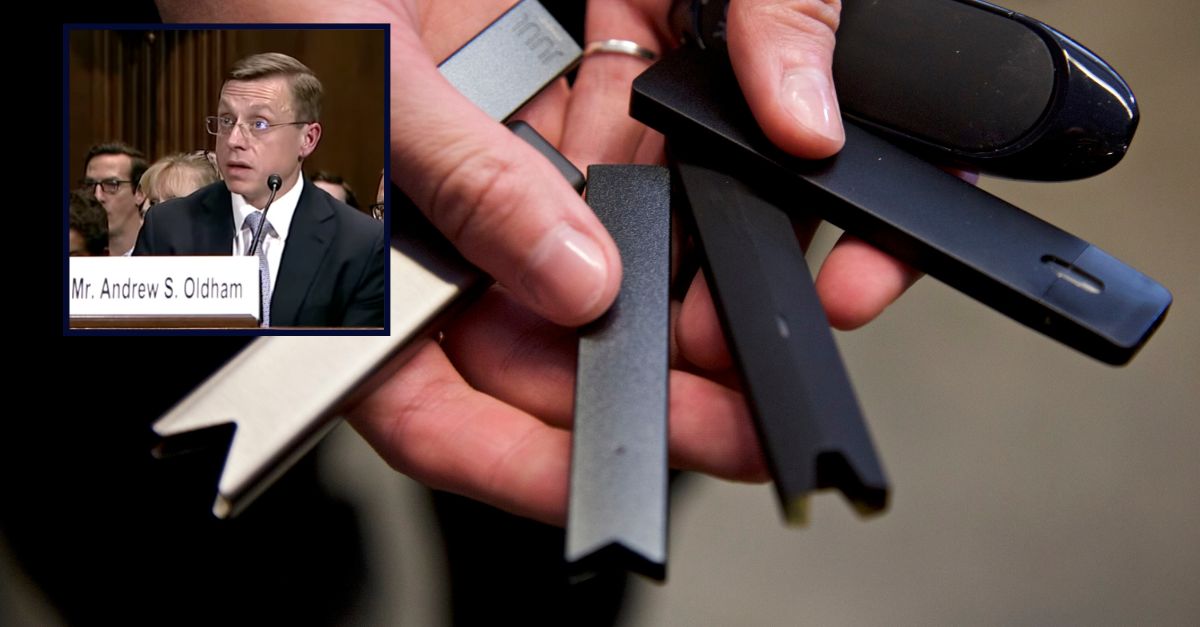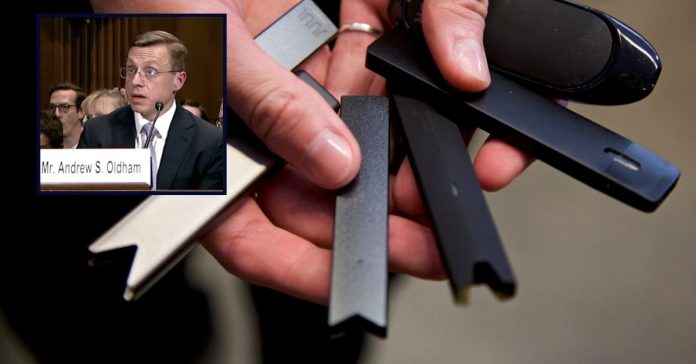
FILE – In this April 16, 2019 file photo, a researcher holds vape pens in a laboratory in Portland, Ore. According to a Centers for Disease Control and Prevention report released on Wednesday, Sept. 9, 2020, vaping rates among U.S. teenagers fell dramatically in 2020. The drop comes in the wake of 2019’s outbreak of vaping-related illnesses and deaths. (AP Photo/Craig Mitchelldyer, File). Inset: U.S. Circuit Judge Andrew Oldham answers questions during a hearing over his nomination on April 25, 2018 (via YouTube screengrab/Sen. Sheldon Whitehouse).
The nation’s most conservative federal appeals court slammed the federal Food and Drug Administration (FDA) for sending electronic cigarette manufacturers “on a wild goose chase,” and gave the companies another chance to get their vaping products approved.
The en banc U.S. Court of Appeals for the 5th Circuit reversed its own panel ruling Wednesday, voting 10-6 that the FDA acted arbitrarily and capriciously by denying approval of flavored e-cigarettes after requiring companies to submit marketing plans. The court said that the FDA should not have imposed a burdensome submission process on companies only to later condition approval on long-term testing that has not yet been conducted.
The court ordered the case remanded to the FDA for reconsideration. The loss is significant for the FDA and an appeal would mean bringing the dispute before the agency-hostile U.S. Supreme Court.
The 10-member majority slammed the FDA for essentially setting up vape manufacturers to go through the trouble of a massive and complicated submission process without ever actually intending to approve their products.
The agency said manufacturers’ marketing plans would be “critical” to the success of their applications. And the agency promulgated hundreds of pages of guidance documents, hosted public meetings, and posted formal presentations to its website—all with the (false) promise that a flavored-product manufacturer could, at least in theory, satisfy FDA’s instructions.
Despite the manufacturers having “dutifully spent untold millions” to do what the FDA required, the agency “turned around, pretended it never gave anyone any instructions about anything,” denied all one million applications for approval, and “admitted that it did not read a single word of the one million plans.”
Federalist Society member and Donald Trump appointee Judge Andrew S. Oldham penned the colorful opinion in which he described the FDA’s behavior as a “regulatory switcheroo.” Oldham wrote:
As the Supreme Court recently reminded us: “If men must turn square corners when they deal with the government, it cannot be too much to expect the government to turn square corners when it deals with them.” Niz-Chavez v. Garland, 593 U.S. 155, 172 (2021). No principle is more important when considering how the unelected administrators of the Fourth Branch of Government treat the American people. And FDA’s regulatory switcheroos in this case bear no resemblance to square corners
The FDA “never gave petitioners fair notice that they needed to conduct long-term studies on their specific flavored products,” said Oldham.
Oldham said that the FDA provided a yearslong instructional process to vape companies, but then effectively denied that the process “meant anything,” because it “always reserved the implied power to ignore every instruction it ever gave.” The FDA, Oldham wrote, also held “the secret power” to ignore the very marketing plans it had previously said were “critical.”
Oldham described the FDA’s behavior as nothing less than Shakespearean.
“It was the regulatory equivalent of Romeo sending Mercutio on a wild goose chase—and then admitting there never was a goose while denying he even suggested the chase,” the judge wrote, quoting from William Shakespeare’s tragic romance “Romeo and Juliet.”
Joining Oldham’s opinion Chief U.S. Circuit Judge Priscilla Richman and U.S. Circuit Judge Jennifer Walker Elrod, both George W. Bush appointees; U.S. Circuit Judges Edith H. Jones and Jerry E. Smith, two Ronald Reagan appointees; and five Donald Trump appointees: U.S. Circuit Judges Don R. Willett, James C. Ho, Stuart Kyle Duncan, Kurt D. Engelhardt and Cory T. Wilson.
U.S. Circuit Judge Catharina Haynes penned a dissenting opinion joined by fellow George W. Bush appointee U.S. Circuit Judge Leslie Southwick, Barack Obama appointee U.S. Circuit Judge Stephen Higginson, Joe Biden appointee U.S. Circuit Judge Dana Douglas, and Bill Clinton appointee Carl E. Stewart.
In that opinion, Hayes minced no words about the safety issues at play with e-cigarette approval.
“[T]he e-cigarettes are not safe,” the judge wrote. “Just as being shot in the stomach might be less likely to cause death than being shot in the head, but neither one is wanted, neither e-cigarettes nor cigarettes are safe.”
Hayes said given the unsafe nature of e-cigarettes, the companies would have needed to prove — but failed to do so — that their products “so sufficiently assist adults that it would overcome the harm to youth.” Therefore, Haynes said, the FDA was well within its rights to deny the products’ approval by coming to the “reasonable conclusion” that marketing e-cigarettes are “not appropriate for public health.”
Hayes also said the FDA never imposed a requirement for long-term studies.
“Rather, the FDA has always suggested and continues to suggest that such studies might be useful, in particular where, as here, the evidence presented in a PMTA [premarket tobacco applications] is otherwise weak,” she wrote in the opinion.
The agency denied the applications not for lack of “a certain type of study,” but because the manufacturers failed to show that the benefit to adult users would outweigh the risks to youth, Haynes said.
U.S. Circuit Judge James E. Graves, an Obama appointee, wrote a separate dissent that focused on the FDA’s treatment of the marketing plans. Graves said that the agency’s decision to forego any review of those plans had not been arbitrary and capricious.
Eric N. Heyer, an attorney for petitioner Wages and White Lion Investments, L.L.C., provided the following comment to Law&Crime via email Thursday:
We are very pleased that the Fifth Circuit has recognized FDA’s failure to “turn square corners” and hope that FDA’s leadership will engage in a significant course correction by communicating with specificity what applicants must show to satisfy the statutory standard for non-tobacco-flavored ENDS products.
Law&Crime reached out to representatives of the FDA, but did not receive an immediate response.
You can read the full ruling here.
Have a tip we should know? [email protected]

